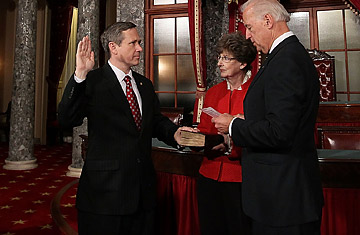
Sen. Mark Kirk (R-IL) (L) is sworn in by Vice President Joseph Biden as his mother Judy Kirk (C) holds a bible during a mock swearing in ceremony on November 29, 2010 in Washington, DC.
Among the dozens of calls Mark Kirk received from fellow Republicans congratulating him on winning President Barack Obama's old Senate seat Nov. 2, the Illinois congressman took one from a Democrat: Secretary of State Hillary Clinton. But her call moved quickly from best wishes to begging a favor: Clinton asked Kirk if he would support the Obama Administration's efforts to ratify the Strategic Arms Reduction Treaty with Russia. "The moment I'm in the Senate, I'll get briefed up," Kirk politely promised Clinton, and since his Nov. 29 swearing-in, Kirk has been requesting stacks of START documents ahead of a vote that may come in the next two weeks.
It was the first of many requests Kirk will be receiving from Obama and his team. Though his win was a symbolic and strategic victory for the GOP, Kirk's political incentives now require the long-time moderate to run to the left as he begins a six-year effort to hold what has been a traditionally deep blue Senate seat. Senate Republican leadership, happy to have him in the fold and understanding his electoral realities, are likely to cut him some slack, but only so much. So as Kirk joins the three or four centrist GOP swing voters remaining in the Senate, the question is how independent a Republican will Mark Kirk be.
First, consider the resume. The son of a computer installer, Kirk grew up in Chicago's suburbs. He went to Cornell, the London School of Economics and Georgetown's Law School, and for several years was chief of staff to veteran Illinois Congressman John Porter, a Republican. He barreled though several bureaucratic jobs, including at the State Department, and became a Navy Reserve intelligence officer, serving in the Balkans.
In November 2000, at age 41, he was elected to succeed Porter in the House despite having spent most of the previous two decades living in Washington. He carried the powerful endorsement of his political mentor, Porter, and the Chicago Tribune, which predicted that Kirk "would be guided by conscience."
The district, mainly in Chicago's northern suburbs, is affluent, fiscally conservative and socially moderate, and in the House Kirk reflected that reality. Kirk voted against Democrats' health care reform bill, and for a proposal to give tax breaks to oil companies. But he defied Republican leadership by voting against a bill that would bar agencies receiving federal funding from discriminating against groups that refuse to provide abortions. Three years later he again rebuffed his party's leaders by voting to repeal limits on federal spending on embryonic stem-cell research. Then, in 2007 Kirk bucked his party and supported a bill granting health insurance coverage to 9 million children. He ended up leading the dwindling House GOP moderates in the Main Street Republican Partnership, a centrist group.
Despite reflecting his district's disparate mood, Kirk barely smacked down Democratic challenges in 2006 and 2008 from political newcomer Dan Seals. Illinois politics were upended by then-Gov. Rod Blagojevich's attempt to sell Obama's Senate seat. With his Washington experience, Kirk passed on a run at governor figuring, "the federal issues are things I can hit the ground running on."
This year's Senate race was especially grueling, and one of the country's most competitive. Kirk was found to have embellished his military record, saying he was the Navy's "Intelligence Officer of the Year." He won the election with barely 48% of the vote over Alexi Giannoulias, the 34-year-old state treasurer plagued by corruption allegations. In the Senate, "he's going to want to push integrity issues," says Wayne Steger, chair of the political science department at DePaul University, in Chicago.
Just one week into the job, Kirk has already broken with the GOP to vote in favor of the food safety reform bill championed by the Obama Administration. "It was against the Republican establishment," he says, but "I think they expected it." He adds: "I'm basically, a Republican who does not carry a divisive social agenda into the Senate."
It's worth wondering how much longer he can continue to be so independent. GOP leaders, particularly in the House, are boasting of plans to try to repeal the Obama Administration's signature health care reform law — an idea that's unlikely to ever materialize. On Dec. 4, the GOP picked Kirk to deliver the party's weekly Republican address. Says Sen. Minority Leader Mitch McConnell: "Republicans have an opportunity to refocus the Senate on the priorities of the American people. They've been speaking out, we've been listening."
Kirk may be influenced by the fact that his territory is much broader, politically speaking, than his House seat was, extending from conservative Southern Illinois farming communities along the Mississippi River, to comparatively liberal Chicago. He will find that no decision comes without constituent criticism, and he has plenty of them on the way. On tax cuts, the Dream Act and Don't Ask Don't Tell, Democrats may look to him for help.
And as the President inches closer to winning the 67 Senators he needs to ratify the New START treaty — he has about 59 votes — Kirk could prove the deciding vote. Kirk says he still hasn't decided which way he'll go. For both parties, it will be an important indicator of the new balance of power in the Senate.
